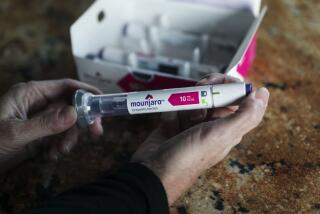Folic Acid May Help Seniors
- Share via
Folic acid may slow the onset of Alzheimer’s disease and minimize the severity of its symptoms, according to epidemiologist David Snowdon of the University of Kentucky. The findings, presented last week at the National Institutes of Health, echo results obtained last year in England in a different population and suggest that physicians now have one more way to combat this debilitating, eventually fatal disease.
The results, from an ongoing study of nuns, also highlight the growing importance of folic acid. Deficiencies of this natural B vitamin in pregnant women have been associated with an increased incidence of spina bifida and other birth defects of the neurological system.
Folic acid deficiencies have also been linked to high blood levels of the amino acid homocysteine, which has been associated with an increased risk of heart disease in men. Research in Wednesday’s Journal of the American Medical Assn. showed a similar link in women.
The good news is that the government last year began requiring fortification of flour and other products with folic acid, and the prevalence of folic acid deficiencies has declined sharply. Physicians caution against consuming excessive quantities of the vitamin, however, because it can mask the symptoms of other diseases.
Higher Doses of B-6 Ease PMS in Studies
Combined results from nine trials involving a total of 940 women indicate that vitamin B-6 supplements of 100 milligrams a day--and perhaps as little as 50 milligrams a day--can sharply reduce the symptoms of premenstrual syndrome. The current recommended dose of B-6 is 2 milligrams a day, and deficiencies are rare, but the new study in Saturday’s Lancet suggests that daily supplements could be helpful.
Dr. Katrina Wyatt and her colleagues from North Staffordshire Hospital in England called for larger trials of the supplement, but cautioned that high doses are potentially dangerous. Doses of 200 milligrams a day can cause numbness in the arms and legs.
Monkeys’ Diet Holds Clues About Humans
Monkeys in the wild have a much greater intake of vitamins and essential minerals than do civilized humans, a finding that suggests our remote ancestors also consumed much higher levels than we do, according to anthropologist Katherine Milton of UC Berkeley. Milton followed monkeys around Barro Colorado Island in Panama and measured their food consumption.
She reports in the June issue of Nutrition: The International Journal of Basic and Applied Nutritional Sciences that the average 15-pound wild monkey takes in 600 milligrams of vitamin C daily, for example, 10 times more than the recommended daily allowance for humans who weigh 150 pounds. The monkey also consumes 4,571 milligrams of calcium a day; the general recommendation for a human is 800 milligrams. Similarly, the monkey consumes 6,419 milligrams of potassium, compared with the recommended 1,600 to 2,000 milligrams for a human, and 1,323 milligrams of magnesium, compared with the recommended 350 milligrams for humans.
“Throughout history, humans have suffered from diet-related diseases,” Milton said. “If we paid more attention to what our wild, primate relatives are eating today, perhaps we could learn new things about our own dietary needs.”
Adults Receive Most Livers Donated by Kids
Many children who need liver transplants are not getting them because donor livers from other children are going to adults, according to a new study by researchers at the University of Pittsburgh Medical Center. As many as two-thirds of all livers from young donors (4,288 of 6,028 pediatric livers between 1991 and 1998) went to adults, they reported May 17 at a Chicago meeting of the American Society of Transplantation.
Donor livers from adults, in contrast, generally cannot go to children because they are too large. One way surgeons are circumventing the problem is by splitting an adult donor’s liver so it can be used in two children. But Dr. Rakesh Sindhi and his colleagues argued that most livers from children should be directed to other children.
Harmful Steroids Often Added to Herbal Creams
Traditional Chinese herbal creams marketed for skin disorders such as eczema often contain potentially harmful levels of steroids, researchers from King’s College London report in the May Western Journal of Medicine. The synthetic steroid, called dexamethasone, was added to the creams.
The researchers found dexamethasone in eight of 11 samples from patients using the creams. Steroids in the creams may have damaging side effects, including thinning and scarring of the skin that may be irreversible, and steroid creams are rarely prescribed for use on the face. The steroids may have systemic effects as well.
Antidepressant Helps Weight Loss in Study
Bupropion, a drug approved to treat depression and help people quit smoking, may also be useful in weight loss, Duke researchers reported Tuesday at a Washington meeting of the American Psychiatric Assn. Results of the first eight weeks of their study showed that women who took bupropion in conjunction with a 1,600-calorie diet lost four times as much weight as those taking a placebo, said Dr. Kishore Gadde.
Unlike previous weight-loss drugs such as fenfluramine and phentermine, bupropion has no appreciable effect on the brain chemical serotonin and thus has fewer side effects. The only significant side effect was dry mouth. Bupropion works by increasing available amounts of norepinephrine and dopamine, two chemicals in the reward and pleasure pathways of the brain.
Women who received 200 milligrams of the drug every day said that it did not suppress their appetite but helped them feel satisfied more easily.
Drug Shows Promise for Irritable Bowel Syndrome
A new drug called alosetron, trade-named Lotronex, is the first drug shown to relieve pain and discomfort caused by irritable bowel syndrome, according to results presented Tuesday at the Digestive Disease Week meeting in Orlando, Fla. IBS affects as many as one in five Americans--and three times as many women as men--but current treatments are aimed only at specific symptoms, such as anti-diarrheals for diarrhea or laxatives for constipation.
Dr. Lin Chang of the UCLA School of Medicine reported on studies of 1,273 non-constipated women at 200 clinical sites, half of whom received alosetron and half placebos. Those receiving alosetron reported significantly less bowel pain and sharply improved bowel function. The beneficial effects disappeared, however, within a week after they stopped receiving the drug.
Alosetron is thought to work by blocking serotonin 5-HT3 receptors in the gastrointestinal tract and the nervous system. These receptors mediate pain perception and gastrointestinal motility.






